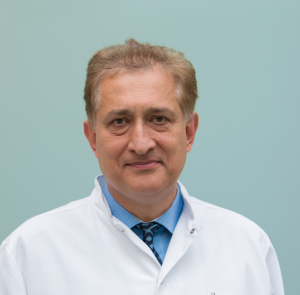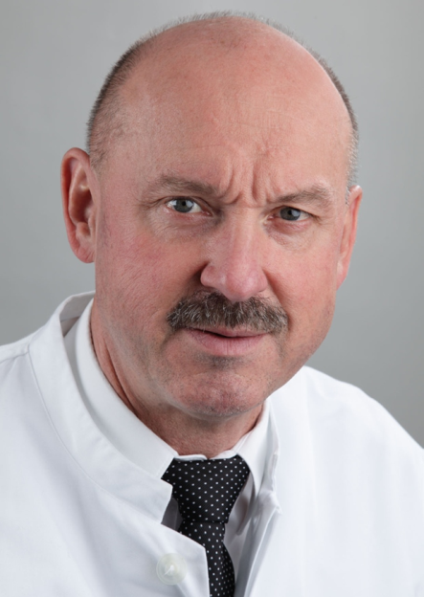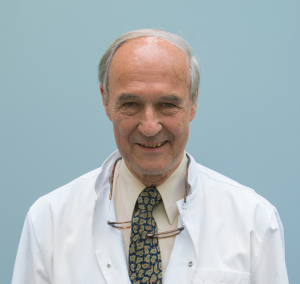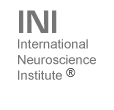Neurology
The neurological department of the INI – International Neuroscience Institute® offers professionell expertise in different neurological fields:
- Neurological Consultant (Prof. Reinhard Dengler, MD)
- Surgical Neurology (Prof. Hans-Joachim Freund, MD)
- Diagnostic Neurology (Prof. Bahram Mohammadi, MD)
Clinic Management

Clinik for Neurology
Email:
mohammadi@ini-hannover.de
Phone:
+49 511/ 270 92 – 830
Neurological Consultance
Clinical Expertise:
General Neurology,
Special areas of expertise: Diseases of peripheral nerve and muscle (incl. ALS/ Motor Neuron Disease), Central Movement Disorders (e.g. Parkinsonian Syndromes and Dystonia) and electrodiagnostic studies.
Prof. Dengler was Director of the Department of Neurology of Hannover Medical School (MHH) until 2015 and is still active in research and in academic committees.
He holds regular consultation hours in the INI outpatient clinic.
Education:
Medical studies at LMU Munich and TU Munich. MD thesis on pharmacological treatment of spasticity. Military services at the Bundeswehr Center-Hospital in Koblenz. 1977 Post Doc at the Department of Physiology of the TU Munich involving in experimental research in the field of neuromuscular disorders. In 1978 start of his training in neurology und clinical neurophysiology, thereafter appointment as senior consultant and academic habilitation for neurology (Brainstem Reflexes) in the Department of Neurology of TU Munich. In 1986 sabbatical (DFG- sponsored) at the Physiological Institute of the University of
Alberta, Edmonton, Canada (experiments on the physiology of nerve and muscle in man).
In September 1989 appointment as full Professor of Neurology at the University of Bonn, Germany, and Vice-Chairman of the Department of Neurology. Head of the lab for clinical neurophysiology und of the section of physiotherapy.
From December 1992 until September 2015 Professor of Neurology at Hannover Medical School and Director of the Department of Neurology. Development of a high-end academic neurological center providing all modern neurodiagnostic und therapeutic options. Installation of several research groups (e.g. Multiple Sclerosis, Stroke, Central Movement Disorders, Neuromuscular Disorders). Regular student teaching.
Research:
Areas of personal research interest are neuromuscular disorders incl. motor neuron disease/ALS, central movement disorders and experimental and clinical neurophysiology. He was Principal Investigator in the DFG-sponsored Cluster of Excellence „Hearing for All“ until 2016. His list of publications comprises more than 300 articles. He is member of the Executive Board of „Clinical Neurophysiology“ (Elsevier) and was on the Editorial Board of „Muscle and Nerve“ (Wiley) until recently. He was Associate Editor of Amyotrophic Lateral Sclerosis“ (Taylor and Francis) until 2012 and Editor in Chief of “Klinische Neurophysiologie” (Thieme) until 2016.
Certificates:
Prof. Dengler is a board certified Neurologist, and Clinical Geriatrist. He holds certificates for Electroencephalography (EEG), Electromyography (EMG) und evoked Potentiales (EP) of the DGKN.
Honours and Awards:
He was awarded the „Richard-Jung-Preis“ of the German Society for Clinical Neurophysiology (DGKN), the „PRIX „THEOPHILE GLUGE“ of the Belgian Royal Academy of Arts and Sciences and the “Robert-Schwab-Award” of the American Clinical Neurophysiological Society (ACNS). He is „Foreign Member“ of the Bulgarian Academy of Sciences and a Honorary Member of the DGKN.
Memberships:
German Society of Neurology (DGN); American Academy of Neurology (AAN); German Society for Clinical Neurophysiology (DGKN); American Association of Neuromuscular and Electrodiagnostic Medicine (AANEM), German Society of Muscle Disorders (DGM, member of the Executive Committee). International Federation of Clinical Neurophysiology (member of the Executive Committee).

Email:
dengler@ini-hannover.de
Phone:
+49 511/ 270 92 – 405
Surgical Neurology
The emphasis is on the selection of patients for the new operative indication field Restorative Neurosurgery in cooperation with the epileptologist Professor Stefan. The aim is the removal of pathological tissue areas that lead to malfunction:
1. Epileptic foci leading to frequent seizures which are not controllable via medication.
2. Pathological processes of the central region (scar states, cavernomas, malformations of the cerebral cortex in case of migration disorders), which lead to motor failures. Since both processes are processes of the cerebral cortex, only minor superficial interventions with functional monitoring are required.
Prof. Hans-Joachim Freund represents this new specialty at the interface of neurology and neurosurgery. It includes the indication for special neurosurgical interventions including deep stimulation and preoperative diagnostics with a focus on functional resonance tomography. After studying in Hamburg and Freiburg, Prof. Freund completed his training in neurology and neurophysiology at the clinic of Prof. Jung at the University of Freiburg. From 1974-75 he was Visiting Professor at the University Institute of Neurology, National Hospital, Queen Square, London, and 1984 Visiting Scientist at Dep. of Neurophysiology at the NIH in Bethesda / Maryland.
From 1977 to 2001 he was Professor of Neurology and Director of the Department of Neurology at the University of Dusseldorf. He turned down offers from Freiburg and Hamburg. Prof. Freund was a member of the Senate from 1978-1984 and Vice President of the German Research Foundation from 1990-1993 and Chairman of the Senate Commission for Clinical Research of the DFG and a member of the Executive Board of the German Society for Naturalists and Physicians.
From 1991 to 1999 Prof. Freund was chairman of the German Stroke Foundation and 1982-1990 spokesman of the special research area 200: Pathological Mechanisms of Brain Function and from 1991-2001 spokesman of the subsequent Collaborative Research Center 194: Structural Change and Dysfunction in the Nervous System. These topics were then also the basis of his interest in working closely with leading neurosurgeons. In 1994, the close collaboration with Prof. Volker Sturm began on the then new field of deep stimulation of the brain, which became the German focal point in the cooperation of the Dusseldorf and Cologne clinics. From 2002, he was appointed to the world’s leading neurosurgical center in Hanover, the newly founded INI, where he built the Department of Neurological and Neurosurgical Neurology. These include function-improving interventions in structural lesions such as migration disorders, i.e. local malformations, or scar lesions.
Prof. Freund is a member of several academies:
- North Rhine-Westphalian Academy of Sciences
- German Academy of Sciences,
- Leopoldina- Acatech Convention for Technical Sciences of the Union of German Academies of Sciences
- Fellow of the Royal College of Physicians (FRCP) London
- Foreign Associate Member of the Academie Royale de Medecine Belgique
He was a member of various editorial boards:
- Advances in Neurology
- Archives of Neurology, Brain, Neuroscientist
- Restorative Neurology.
In 1995, he was awarded the 1st Class of the Order of Merit of the Federal Republic of Germany. In 2002 the University of Zurich awarded him with an honorary doctorate. In 1993 Prof. Freund received the Carmichael Medal London, in 1994 the Berger Prize of the German Society for Clinical Neurophysiology and Functional Imaging, in 1995 the Laufberger Medal of the Czech Physiological Society, in 2000 the Robert Pfleger Prize together with Thomas Brandt and Johannes Dichgans and in 2001 he was awarded the Wilhelm Erb Gedenk Münze der Deutschen Neurological Society.
He is the author of numerous books and has organized a number of international conferences, including the Fifth International Conference on Functional Mapping of the Human Brain of the Human Brain Mapping Society 1999.
His main fields of work are:
- Cortical organization of motor function and its functional reorganization
- Functional imaging and cerebral plasticity as well as the deep stimulation of the brain.
Prof. Freund is married and has three adult sons.

Email:
freund@ini-hannover.de
Phone:
+49 511 / 270 92 – 405
Diagnostic Neurology
Prof. Dr. med. Bahram Mohammadi is Director of the Department of Neurology at the INI – International Neuroscience Institute® in Hanover. Prof. Mohammadi studied human medicine at the Hannover Medical School (MHH). From 1999 to 2005 he completed his training as a neurologist in the Department of Neurology of the MHH (Director: Prof. Dr. R. Dengler) and in 2005 became a specialist in neurology, working until until 2006 in the neurology department of MHH as a specialist in electrophysiology and neurodegeneration. From 2006 to 2010 he worked clinically as Senior Physician at the INI – International Neuroscience Institute® Hannover and in 2010 he moved to the Department of Neurology of the University Medical Center Schleswig-Holstein, Campus Lübeck (Director: Prof. Dr. T. F. Münte). Since 2011 he is director of the Department of Neurology at INI Hannover. In 2000 he was appointed Doctor of Medicine by the Faculty of Medicine of the MHH. The subject of his dissertation was the “Paramyotonia Congenita: Electrophysiological basis of cold sensitivity of the symptoms acquired using the patch-clamp technique.” After further scientific work with the focus on “Experimental Studies on the Physiology and Pharmacology of Inhibitory Ligand-Activated Ion Channels” in 2006 he was awarded the Venia Legendi Award by the Neurology Faculty of MHH.
From 2006 to 2010 he was a fellow of the German Research Foundation (DFG) in the field of clinical neuroscience. During this time, he co-founded a new functional imaging research group in neurology, psychiatry and psychology at INI. In 2011 he was appointed professor (APL). The CNS-LAB in the INI under his leadership initiated various national and international cooperations. Clinically, he uses functional imaging for preoperative diagnosis and brain mapping in neurosurgical patients.
Special fields of work and research:
Neurodegeneration (e.g., motor neurone disease (amyotrophic lateral sclerosis, ALS)) movement disorders (e.g., Parkinson’s syndrome, dystonia) botulinum toxin therapy (e.g., in dystonia, hyperhidrosis, spasticity, chronic migraine) functional imaging clinical neurophysiology (electromyography, electroneurography, evoked potentials)
Certificates:
Certificate “Qualified botulinum toxin therapy” of the working group Botulinum toxin of the German Society of Neurology (DGN) Evoked potential certificate of the German Society for Clinical Neurophysiology and Functional Imaging (DGKN) Electromyography and Electro-Neurography Certificate of DGKNEelectencephalography. Certificate of DGKN.
Memberships:
German Society of Neurology (DGN), German Society for Clinical Neurophysiology and Functional Imaging (DGKN), Working Group Botulinum Toxin of the DGN Organization of Human Brain Mapping, (OHBM) NISALS Oxford, UK (Neuroimaging in ALS)
Cooperation:
Medical University of Schleswig-Holstein, Campus Lübeck, Medical University Hannover, Otto-von-Guericke-University Magdeburg, MIRA Institute for Biomedical Technology and Technical Medicine, University of Twente, Enschede The Netherlands, Clinical Neuroscience Department, Division of Neuroscience and Mental Health, Imperial College London, United Kingdom.

Clinic for Neurology
Email:
mohammadi@ini-hannover.de
Phone:
+49 511/ 270 92 – 830
